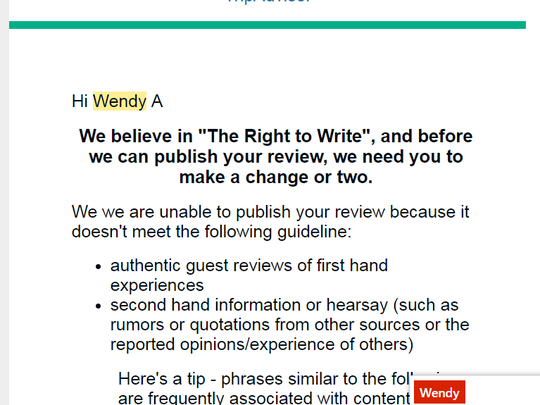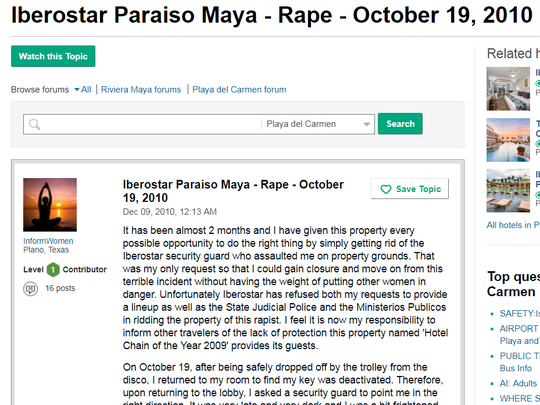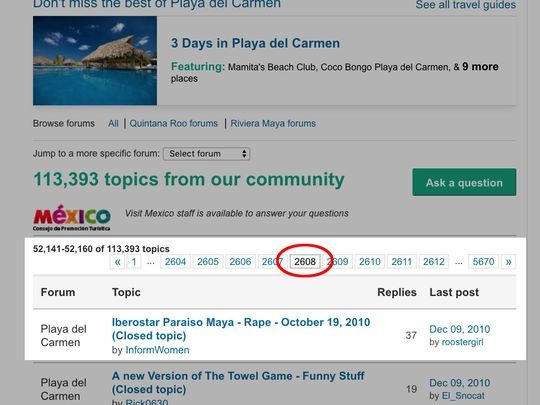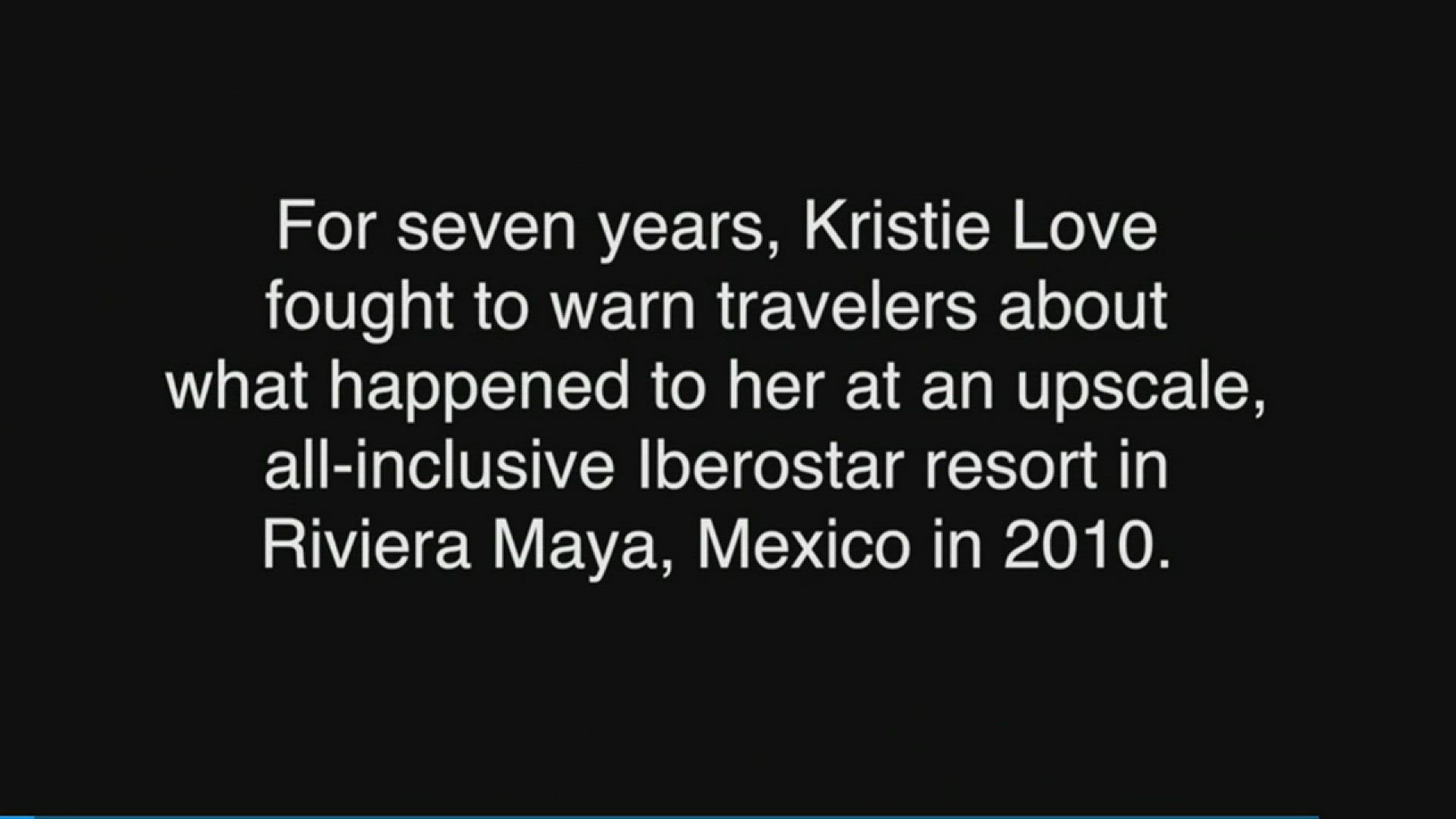In late July, a woman from Indianapolis posed a question on TripAdvisor:
Should she and her husband travel to Riviera Maya for a Mexican vacation? They had read about problems with alcohol at the resorts — vacationers who blacked out and were assaulted, robbed, raped, even died.
Her husband wanted to cancel; she did not.
Replies began popping up in the forum within minutes. After 10 days, there were 55 in all.
Twenty-four of the comments encouraged the couple not to worry.
“Just got back on Saturday and never felt safer,” wrote BeachDog77 from New York.
“I live close to St. Louis and feel much safer in Riviera Maya then I do going to a Cardinals baseball game,” concurred BeachQueen51.
Four included irrelevant comments, such as “Thank you,” or “The pools are 4.3 feet deep.”
More: As dozens more report blackouts at Mexico resorts, country says it will act on tainted alcohol
What about the other 27 posts? Did anyone express worry, describe problems or share experiences that might serve as warnings?
The public had no way to know.
The posts had all been removed from the forum.
In their place was a message from TripAdvisor that cited various reasons for the deletions: They were “determined to be inappropriate by the TripAdvisor community,” or removed by staff because they were “off-topic” or contained language or subject matter that was not “family friendly.”
The Milwaukee Journal Sentinel asked TripAdvisor to see the posts that were removed. The company refused.
Since July, when the Journal Sentinel began investigating the mysterious death of a Wisconsin college student in Mexico — and found widespread problems with tainted alcohol, derelict law enforcement and price gouging from hospitals — more than a dozen travelers from across the country have said TripAdvisor muzzled their first-hand stories of blackouts, rapes and other ways they were injured while vacationing in Mexico.
“To me it’s like censoring,” said Wendy Avery-Swanson of Phoenix, whose recent review of a Mexican resort — describing how she blacked out from a small amount of alcohol served at the swim-up bar — was removed from the website.
“It wasn’t hearsay,” as TripAdvisor claimed, said Avery-Swanson, 52. “It actually happened to me.”

Massachusetts-based TripAdvisor touts its more than 535 million user reviews of hotels, restaurants and attractions around the globe. And company officials say it uses finely tuned software to detect fake reviews and has hundreds of employees dedicated to policing posts and ensuring “content integrity.”
A Journal Sentinel investigation into the workings of the $1.5 billion company has found that it is what TripAdvisor does not publish that poses real problems for travelers.
The company’s policies and practices obscure the public’s ability to fully evaluate the information on its site. Secret algorithms determine which hotels and resorts appear when consumers search. Some hotels pay TripAdvisor when travelers click on their links; some pay commissions when tourists book or travel.
An untold number of TripAdvisor users have been granted special privileges, including the ability to delete forum posts. But the company won’t disclose how those users are selected.
There’s no way to know how many negative reviews are withheld by TripAdvisor; how many true, terrifying experiences never get told; or for site users to know that much of what they see has been specifically selected and crafted to encourage them to spend.
“This is a major problem with online reviews, they’re heavily skewed,” said Bart De Langhe, an associate professor of marketing at ESADE business school in Barcelona, Spain, who specializes in consumer behavior and user reviews. “We live in this illusion of perfect information ... but we don’t ask the hard questions and don’t realize the information is imperfect and biased.”
The average rating for all hotels on TripAdvisor is a favorable 4 out of 5. An analysis by the Journal Sentinel of listings for one tourist region in Mexico found 74% of the hotels rated with 4s or 5s. When looking at the largest 100 hotels in the same area, that number jumps to 96%.
Positive reviews on travel sites translate into higher prices hotels can charge. A 2012 study by the Cornell University School of Hotel Administration of a different travel site found that if a hotel’s review scores climb by one point, on a five point scale, the hotel can increase its price by 11% and still maintain the same occupancy rate.
User ratings of all kinds carry an overblown amount of credibility, De Langhe said.
“It’s very clear that these reviews have a major influence on sales,” he said. “And they shouldn’t.”
In the case of the 17-year-old TripAdvisor — which built its reputation as a free bulletin board for traveler advice — it may not be at all obvious to consumers that its business model depends on travelers doing more than writing and reading reviews; it’s contingent upon travelers booking trips.
In an August filing with the U.S. Securities and Exchange Commission, TripAdvisors’ chief financial and accounting officers stressed the importance that the company “convert these visitors into engaged users and bookers.”
“Advertisers will not continue to do business with us if their investment in such advertising does not generate sales leads, customers, bookings, or revenue and profit,” they wrote.
* * *
Seven years ago, TripAdvisor repeatedly removed a post written by Kristie Love, a 35-year-old mother of two from Dallas. Love told how she had been raped by a security guard at a highly rated all-inclusive Mexican resort owned by the global chain, Iberostar, based in Spain.
She wrote how, after an evening with friends, she had returned to her room to find the electronic key card no longer opened her door at the Iberostar Paraiso near Playa del Carmen. She headed to the lobby of the sprawling resort to get her card reactivated and stopped to ask a uniformed guard whether she was walking in the right direction.
He motioned her to follow him, then overpowered her, dragged her into some bushes and raped her. When she reached the lobby in tears, hotel staff refused to call police.

A TripAdvisor moderator spotted the post soon after it had published and deemed it in violation of the company’s “family friendly” guidelines.
The following year, another young woman, 19 and on vacation with her family, reported to hotel officials in the same resort complex that a security guard had raped her in the bathroom.
And in 2015, still another woman, Jamie Valeri, 34, a mother of six from Wisconsin, was sexually assaulted at the same resort after she and her husband simultaneously blacked out in the middle of the day, barely into their third drink.
Those are just the rapes at one resort reported directly to the Journal Sentinel by travelers who read earlier stories.
Like Love, Valeri tried to warn others on TripAdvisor. The company labeled her comments “hearsay” and removed her posts. After a few unsuccessful attempts at re-wording her review, she gave up.
Had TripAdvisor not deleted Love’s post seven years ago, and any others like it, “Maybe we wouldn’t have gone or maybe that wouldn’t have happened to me,” said Valeri, who lives in Neenah.
Gary Davidson, a Miami attorney who specializes in travel law, said TripAdvisor has an ethical obligation to warn tourists about dangerous situations, though not necessarily a legal one.

“It’s the kind of information we absolutely want published,” Brian Hoyt, spokesman for TripAdvisor, told the Journal Sentinel.
The forum post landed in its original chronological spot, more than 2,600 pages deep, behind thousands of more recent threads.
The thread is closed, so no one can add a new comment.
* * *
Like most sites that allow reader comments, TripAdvisor’s guidelines for posting on its forums and for writing reviews are aimed at keeping out profanity, spam and fake or irrelevant content.
First-hand information shared by travelers is central to the company’s success.
The popularity of what consumers perceive as trustworthy user reviews from fellow travelers propelled the website from its inception as a tiny, online travel guide in 2000 to its prominence today as an indispensable tool used by hundreds of millions of travelers worldwide with sites in 28 languages. The company receives more than 290 new contributions every minute.
TripAdvisor says it maintains a firewall between its customer-generated content and the money-generating deals it makes with hotels and chains, such as Iberostar, and online booking partners, such as Expedia and Priceline.
The company has faced criticism from the business community for allowing unverified posts containing seriously damaging accusations, such as a resort manager being a pedophile. In a growing number of cases, businesses have threatened to sue reviewers for their negative comments, a trend that has prompted TripAdvisor to push for stronger laws to prevent such suits.
TripAdvisor uses dozens of filters to help detect fake reviews — positive and negative — and has about 300 employees dedicated to preserving content integrity, according to Hoyt.
“We’re not an arbiter of fact, but we’re trying to provide the most accurate picture,” he said, noting there are negative reviews on the site, including some that contain allegations of rape.
A Journal Sentinel examination of TripAdvisor identified a host of issues that inhibit users from getting a full picture of the company’s operation.
Consider:
• Some non-employees — termed “trusted community members” — have the ability to remove forum posts. But TripAdvisor won’t disclose who they are or how they are selected, or what, if any, safeguards exist against conflicts of interest. “It’s an internal metric that we look at that helps us determine if someone is trustworthy, they’ve given good advice that others have viewed that to be helpful," Hoyt said.
• Those designated by TripAdvisor as “destination experts” — people the company uses to respond to safety concerns or suggest restaurants or activities — can include local tour guides, resort managers, real estate brokers, property owners and others with a financial stake in attracting tourists to the area. Those conflicts are are not disclosed to site visitors. If TripAdvisor detects that destination experts are “overly promoting” their businesses, the company will warn them or take away their designation, Hoyt said.
• TripAdvisor doesn’t verify that reviews are written by people who actually stayed at hotels, went to attractions or ate at restaurants. The company says a confirmation process would end up excluding input from people who shared the experiences but didn’t pay the bill.
• The placement TripAdvisor’s hotel booking partners receive on the site is based in part on the commission the partners pay or the price they pay TripAdvisor each time a visitor clicks on their link, according to interviews and company reports to shareholders. That price is determined through an automated auction. “Primary factors used to determine the placement of partner links on our site include, but are not limited to the size of the bid relative to other bids, room night price, and other variables,” the company told investors in its August SEC filing. Hoyt said the bidding does not allow hotels to buy their way to the top.
• TripAdvisor launched an “instant booking” feature in 2014 that allows travelers to initiate the booking process directly on TripAdvisor. The company has contracts with some hotels and online travel agencies that earn TripAdvisor a 12% to 15% commission when travelers book or complete their stays.
-- The company’s policy against posts that include “hearsay” is inconsistently enforced. Some posts that remain include such statements as “My husband went crazy for the red curry,” or “My wife went and said it was really nice a bit more walking than she wanted. But she liked the boat ride and the views on the island.”
Other posts, with serious information about dangers, such as Jamie Valeri’s, get deleted.
Valeri described in a post what happened to her and her husband in 2015 when they blacked out after a few drinks and awoke to learn she had been assaulted and he had a broken hand.
The Journal Sentinel confirmed the details of the Valeri’s Mexico experience, and those of others, through receipts, email records, phone records, hotel documents, medical reports and interviews.
Valeri wrote on TripAdvisor that when the couple sought medical help after returning to the United States, “the doctor said the way the break (on her husband’s hand) was he had to have hit someone or something very hard making a fist.”
Hoyt said her reference to “a third party medical diagnosis” violated TripAdvisor’s hearsay guidelines.
Parents of those who died at Mexican resorts told the Journal Sentinel they, too, were blocked from alerting travelers to the tragedies. If they hadn’t seen what happened themselves, TripAdvisor told them, it was considered hearsay.
***
Shelly Khan showed up at the front desk at Iberostar Grand Paraiso in the middle of August, excited for a short getaway from the demands of college and her work as a paramedic in New York City.
She said she chose Iberostar, an all-inclusive resort in Riviera Maya, because she had seen all the positive reviews on TripAdvisor: About how the staff was great, the food was good and the drinks were delicious.
With her sister by her side and documents in hand confirming the room they had booked for a three-night stay, she approached the counter to check in. The receptionist plugged her information into the computer and then informed them that one of the reservations had been canceled.
They had only paid for one person, she said. They would have to pay $1,200 more if they both wanted to stay at the resort.
The Khan sisters showed the receipt for the $2,600 they had already paid. After much arguing, the hotel reduced the amount owed to $700. Pay it now with cash or credit card, or be put on the street. Those were the options. Khan called her parents and they provided a credit card number.
The rest of their stay was terrible, said Khan, 27. The hotel manager followed them around glaring at them most everywhere they went. Feeling threatened, they ended up spending a majority of their time locked in their room.
“We were terrified,” she said. “I’ve never felt so unsafe. We handle some really tough neighborhoods in New York (as a paramedic) and I’m never afraid for my life ... It was all about money at the end of the day.”
Back in New York, Khan wanted to let others know what happened. She wrote up a review describing the experience and submitted it to TripAdvisor. The company declined to publish it. In an Aug. 22 email to Khan, TripAdvisor suggested her post contained hearsay and explained in the company’s boilerplate response:
“Here's a tip — phrases similar to the following are frequently associated with content that violates this guideline: ‘The owner is known for ...;’ ‘In speaking with another guest we met, they mentioned …’; ‘The police officer told us this kind of thing happens all the time…’”
“My post had nothing like that,” Khan said. “It wasn’t third party.”
Khan did not have the full text of what she wrote because users who fill out a form on TripAdvisor’s site can’t see or retrieve their sent submissions that aren’t published. However, the email TripAdvisor sent her rejecting the review included a large portion of her original post. There was no hearsay in that excerpt.
***
Mary Engle, associate director for advertising practices with the U.S. Federal Trade Commission, said user-review websites aren’t regulated the way, say, the Food and Drug Administration regulates food products.
Yet companies do have to adhere to truth-in-advertising laws, and the FTC is partially responsible for enforcement. Engle says her agency looks at what companies say they offer and what consumers expect from companies.
“It depends on what the websites say about what they do,” Engle said. “If they say they post all the good, the bad and the ugly, then that’s what they have to live up to. The basic rule for us is that it’s truthful and not misleading …
“If they’re taking down negative reviews, that would be misleading.”
Engle said the agency published a letter regarding search engines and consumer expectations in 2013. It reminded search companies, such as Google and others, what constitutes advertising.
“Including or ranking a search result in whole or in part based on payment is a form of advertising,” the letter states. “To avoid the potential for deception, consumers should be able to easily distinguish a natural search result from advertising that a search engine delivers.”
TripAdvisor’s top listing on hotel search results is a sponsored spot and is marked as such. There’s no indication on the booking links that placement may be based in part on the bidding process the company describes in its SEC filings.
The FTC has not taken any enforcement action against TripAdvisor.
In late 2014, Italian regulators fined the company $600,000 for failing to adequately weed out fraudulent reviews.
And in 2011, the Advertising Standards Authority in the United Kingdom launched an investigation into TripAdvisor’s use of the slogan “Reviews you can trust.” The following year, it held the company “should not have implied that all the reviews that appeared on its website were from real travellers, or were honest, real or trusted.”
TripAdvisor changed its slogan to “Reviews from our community.”
***
Travelers increasingly rely on user-generated content to make decisions, and when searching for hotels one might assume that user reviews posted on independent sites might be similar and draw comparable conclusions.
Not so.
When the Journal Sentinel compared the first 10 hotel listings in Playa del Carmen on TripAdvisor with those on Google’s Hotel Finder, which also features user reviews of hotels, just 30% of the hotels overlapped.
That means what Google determines are the first 10 hotels travelers should see on their screens is quite different from the results the same search produces on TripAdvisor.
While the average user ratings for all the hotels are similar on both — between 4.5 and 4.6 “bubbles” or stars — the companies only agree on three of the 10 that each presents as top choices.
Even a search for the first 100 hotels produced similarly confusing results for consumers; just 48% appear on the lists from both websites.
TripAdvisor said its results are tailored to individuals based on previous search history, prior purchases and assumptions it makes from the search, among other factors. The Journal Sentinel’s analyses, however, were based on searches from private browsers with no search histories.
Adding to the confusion, consider the rankings of the Carmen Hotel in Playa del Carmen.
Over the first nine months of 2017, the Carmen Hotel was rated between 4 and 5 in 95% of the reviews posted on TripAdvisor. For the same time period, just 79% of the reviews posted on Google were that high.
The opposite is true for another hotel, The Hotel Hacienda del Caribe. In comparing reviews that date from 2013 through mid-October 2017, only 66% of reviews on TripAdvisor rated Hotel Hacienda del Caribe as a 4 or 5, while on Google that number was 84%.
Consumer reviews typically skew highly positive due to a couple of factors, said De Langhe, the tourism marketing professor from Barcelona.
The "brag and moan factors,” as De Langhe calls them, result in people who are really pleased or extremely angry posting reviews more frequently than those who don’t have strong opinions.
The brag factor is stronger, skewing the data in a positive direction. It is derived, in part, because people already spent their money expecting to like the purchase and enjoy themselves, and are therefore inclined to validate their expense. Experiences that rate a 2 or 3 are greatly underrepresented, he said — even if the website isn't biased against them.
In addition, a spot check of seven recent forum threads pertaining to alcohol safety problems found 17% of comments had been deleted. That compares to about 2% in a sample of nearly 1,000 more general threads.
TripAdvisor would not allow the Journal Sentinel to see any posts or reviews that had been removed.
“Once we determine that content should be removed and violated our guidelines for publishing, that information is no longer publishable or promotable by TripAdvisor,” Hoyt wrote in an email.
Hoyt later said he personally reviewed some of the rejected answers to the question from the Indianapolis woman asking whether she and her husband should take their trip. Without providing any examples, he said a few contained allegations that the news stories about the dangers at Mexican resorts were “fake news.”
He didn’t say why such comments would be considered “off-topic” by TripAdvisor when other approved comments include links to stories from Mexican newspapers that focused on assurances from the local health ministry that the alcohol at resorts is safe.
Last week, Hoyt acknowledged that “about a dozen” of the deleted posts should not have been removed. He said they would be republished.
***
After being raped in 2010, Love just wanted to get home to Dallas as fast as she could.
She knew the odds of a successful criminal conviction were slim, since the resort would not even contact police.
She realized the justice system in Mexico was vastly different from that in the U.S.
She just wanted to ignore what happened and try to move on. similarly confusing results for consumers; just 48% appear on the lists from both websites.
TripAdvisor said its results are tailored to individuals based on previous search history, prior purchases and assumptions it makes from the search, among other factors. The Journal Sentinel’s analyses, however, were based on searches from private browsers with no search histories.
Adding to the confusion, consider the rankings of the Carmen Hotel in Playa del Carmen.
Over the first nine months of 2017, the Carmen Hotel was rated between 4 and 5 in 95% of the reviews posted on TripAdvisor. For the same time period, just 79% of the reviews posted on Google were that high.
The opposite is true for another hotel, The Hotel Hacienda del Caribe. In comparing reviews that date from 2013 through mid-October 2017, only 66% of reviews on TripAdvisor rated Hotel Hacienda del Caribe as a 4 or 5, while on Google that number was 84%.
Consumer reviews typically skew highly positive due to a couple of factors, said De Langhe, the tourism marketing professor from Barcelona.
The "brag and moan factors,” as De Langhe calls them, result in people who are really pleased or extremely angry posting reviews more frequently than those who don’t have strong opinions.
The brag factor is stronger, skewing the data in a positive direction. It is derived, in part, because people already spent their money expecting to like the purchase and enjoy themselves, and are therefore inclined to validate their expense. Experiences that rate a 2 or 3 are greatly underrepresented, he said — even if the website isn't biased against them.
In addition, a spot check of seven recent forum threads pertaining to alcohol safety problems found 17% of comments had been deleted. That compares to about 2% in a sample of nearly 1,000 more general threads.
TripAdvisor would not allow the Journal Sentinel to see any posts or reviews that had been removed.
“Once we determine that content should be removed and violated our guidelines for publishing, that information is no longer publishable or promotable by TripAdvisor,” Hoyt wrote in an email.
Hoyt later said he personally reviewed some of the rejected answers to the question from the Indianapolis woman asking whether she and her husband should take their trip. Without providing any examples, he said a few contained allegations that the news stories about the dangers at Mexican resorts were “fake news.”
He didn’t say why such comments would be considered “off-topic” by TripAdvisor when other approved comments include links to stories from Mexican newspapers that focused on assurances from the local health ministry that the alcohol at resorts is safe.
Last week, Hoyt acknowledged that “about a dozen” of the deleted posts should not have been removed. He said they would be republished.
***
After being raped in 2010, Love just wanted to get home to Dallas as fast as she could.
She knew the odds of a successful criminal conviction were slim, since the resort would not even contact police.
She realized the justice system in Mexico was vastly different from that in the U.S.
She just wanted to ignore what happened and try to move on.

But just before leaving, she had a conversation with a family that had come to the resort with their teenage daughters. They were talking about how the girls were free to wander the resort by themselves.
“As much as I wanted to leave what occurred to me in Mexico, all I could think was ... ‘I’ve got two daughters — one is about to be a teenager, and if this ever happened to her and I didn’t come forth, that makes it my responsibility,’ ” Love said.
“That’s when I got the courage and I thought, ‘OK I can do this.’ ”
She told hotel officials she could identify the attacker and asked to see photos of the staff. A manager promised she would email her the pictures and that the hotel would investigate.
She flew back to Dallas feeling confident something would be done.
It wasn’t. Not only did the hotel never send the promised pictures, when she called to follow up, Iberostar representatives said they had no report of her complaint. Soon they stopped taking her calls. Then they threatened to sue her.
In a statement to the Journal Sentinel, Iberostar Hotels & Resorts said the company “has zero tolerance for any type of illegal or inappropriate conduct.” The company said it investigated Love’s case and the others, but said none of the women chose to pursue their cases.
Love was determined. She traveled back to Mexico within a few weeks to file the needed police reports, set on doing everything she could to hold the resort accountable and to prevent another woman from being raped.
Still, nothing came of it. The police chief, who seemed sincere in his efforts to help, couldn’t get Iberostar to cooperate with the investigation. He was shot dead in his squad car a couple months later. Local news reports said it was likely a killing meant to intimidate law enforcement.
Attorneys in the U.S. told her to drop it.
“I chased it in any direction I possibly could,” she said “At that point, the only thing left I could do was go to TripAdvisor.”
Using the name “informwomen,” she described what happened and how the hotel refused to do anything.
The post was quickly removed. She tried to publish it again. And again it got rejected.
For years, Love fought to warn others any way she could. She posted her story on mexicovacationawareness.com, a website dedicated to alerting tourists to the dangers of Mexico, as well as other blogs and travel sites.
“It consumed me, it consumed me entirely,” she said.
Eventually she had to let it drop.
“I just needed to be able to lay my head at night and know I did the best I could and I felt like I did the best I could in getting the word out,” she said.
When she learned last week her post would be republished, she said she felt a sense of peace. At the same time, she is still distraught that people weren’t alerted sooner.
“I am very thankful the light has finally been shed,” she said.
Asked about the deletions of her warnings, Hoyt told the Journal Sentinel that TripAdvisor had changed its interpretation of the family friendly guidelines in the years since 2010.
“It’s an ever-evolving process,” he said. “We continue to strive to become better.
“Are we perfect? No.”
TripAdvisor did not apologize for the deletion and Love is skeptical the company will truly reform its ways.
So is Jamie Valeri, whose own sexual assault complaint about the same resort has not been reposted.
Josh Resmini, too, is doubtful.
As recently as Oct. 16, Resmini tried to post a review on TripAdvisor of the Grand Velas Riviera Maya, a world-renowned Mexican spa he visited in May.
Resmini described how instead of receiving a relaxing and rejuvenating massage at the resort, he was drugged and then sexually assaulted by the massage therapist.
The Journal Sentinel first wrote about Resmini’s experience in August. He was uncomfortable having his name published at the time. He has since changed his mind and wants others to know of the anguish he’s suffered in the months since the assault, as the resort, travel agencies, hotel trade groups and others have refused to hold anyone accountable.
“Hotel management dodged my calls after I stayed an additional six days in Mexico to formalize my complaint,” he wrote in his TripAdvisor review. “The hotel has denied any responsibility.”
One day later, on Oct. 17, he received an email from TripAdvisor.
“We are unable to publish your review,” it said.
The reason?
Hearsay.
Follow Raquel Rutledge and Andrew Mollica on Twitter: @RaquelRutledge and @armollica

